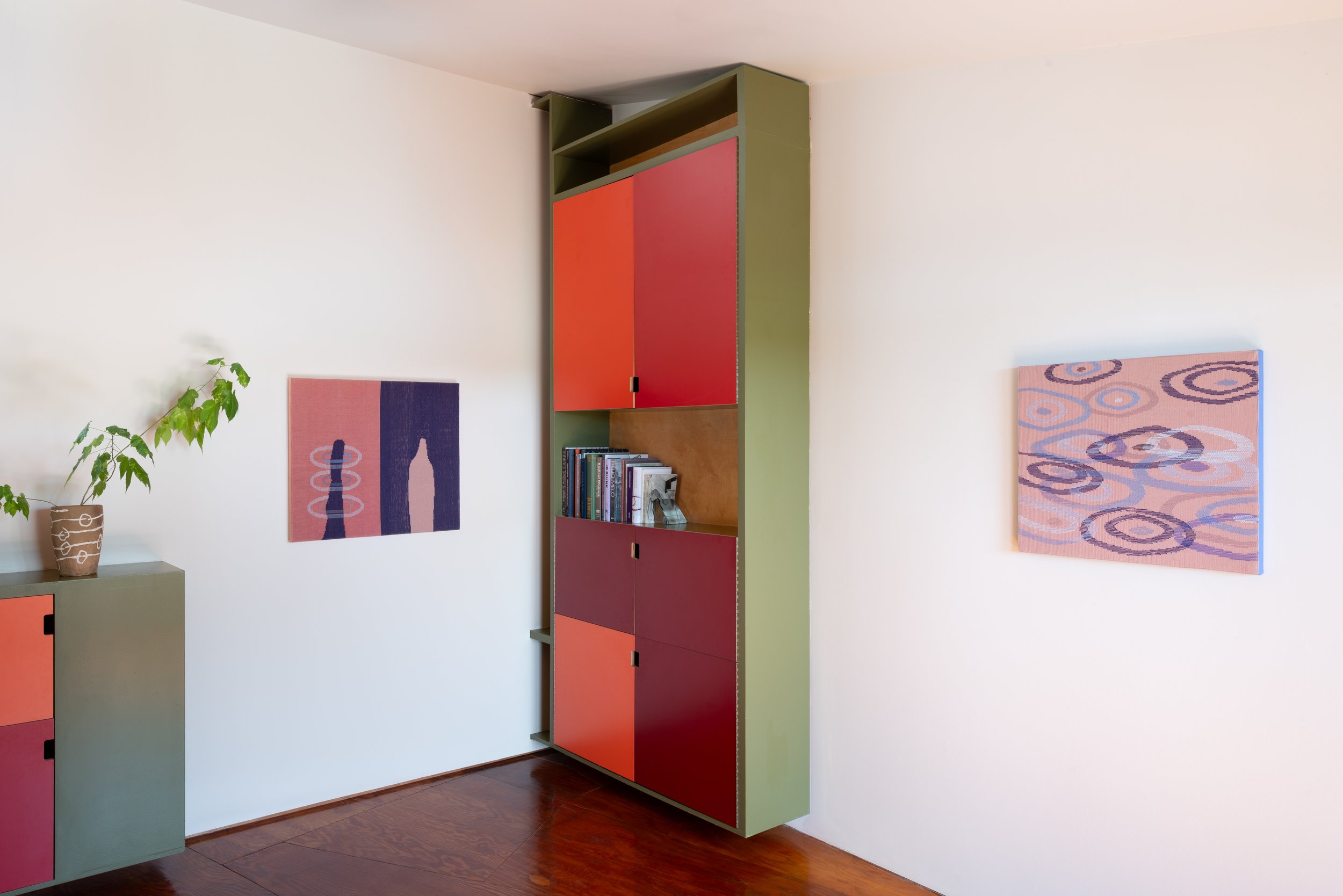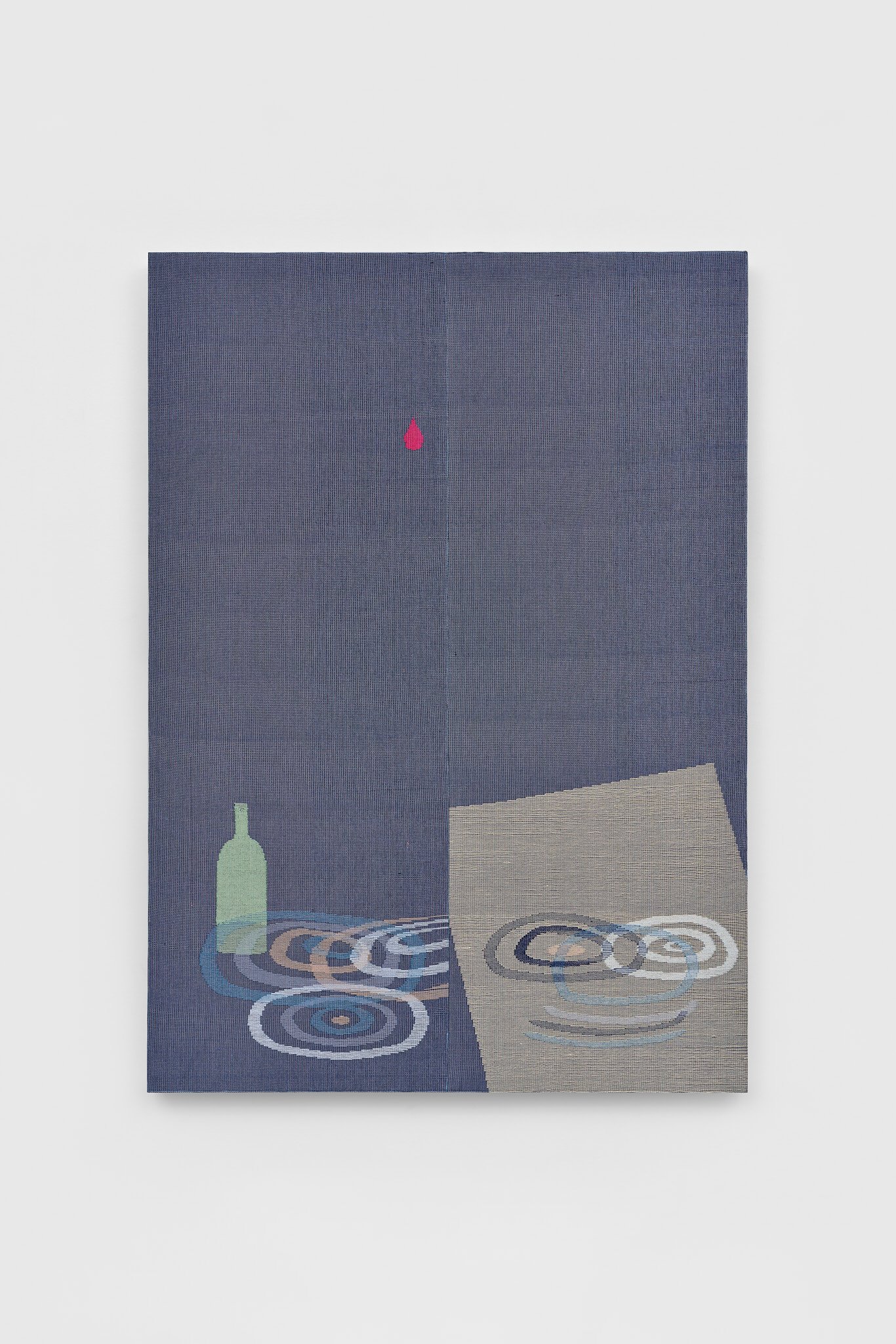Miranda Fengyuan Zhang & Eli Ping
October 28 – December 16, 2023
Curated by Josh Abraham & Sara Lee Hantman
Eli Ping "Monocarp", 2023 Canvas and resin 9 x 13 x 101 inches
Miranda Fengyuan Zhang "Half ripples in pink and blue", 2023 Handwoven cotton 70 3/4 x 50 1/4 inches
Miranda Fengyuan Zhang "Rings", 2023 Handwoven cotton 22 11/16 x 25 1/4 inches
Miranda Fengyuan Zhang "Blue circles and pink ripples", 2023 Handwoven cotton 73 x 50 inches
Eli Ping "Adiaphane", 2023 Oil on canvas 20 x 24 inches
Miranda Fengyuan Zhang "Five bottles", 2023 Handwoven cotton 19 1/4 x 25 1/4 inches
Miranda Fengyuan Zhang "Three ripples and two bottles", 2023 Handwoven cotton 25 3/16 x 28 inches
Miranda Fengyuan Zhang "Rain ripples", 2023 Handwoven cotton 21 11/16 x 25 3/16 inches
Miranda Fengyuan Zhang "Ripples in pink dots", 2023 Handwoven cotton 23 3/4 x 25 1/4 inches
Miranda Fengyuan Zhang "Green bottle and red drop", 2023 Handwoven cotton 70 1/2 x 50 3/8 inches
Eli Ping "Aphakic", 2023 Cast hydrocal 12 x 16 x 1 1/2 inches
Miranda Fengyuan Zhang "Strips and circles (l and ll)" , 2023 Handwoven cotton on stretched cotton canvas 45 1/2 x 25 1/8 inches
The poet, Lisel Mueller, suggested that humans cope with solitude by personifying their surroundings –we derive meaning out of ordinary objects, we daydream beyond the unremarkable, and open up pathways from the void.
Co-curated by Josh Abraham & Sara Lee Hantman, Miranda Fengyuan Zhang & Eli Ping is a two-person exhibition that pairs new works by Zhang (b. 1993, Shanghai, CH) and Ping (b. 1977, Chicago, IL) in a dialogue around the transformation of fiber and when objects function as phenomena. Both artists deftly manipulate cotton to reveal the razor-thin threshold between meaning and oblivion. It is where materials dominate, and concepts follow.
Miranda Fengyuan Zhang approaches traditional weaving as a tool for abstracting and reconstructing images. Similarly to the way cubic pixels comprise a larger digital reproduction, Zhang intertwines cotton to transcribe thread-by-thread the minutiae of everyday routines and her surrounding environment. Utilizing a floor loom, Zhang’s process is meticulous –carefully distributing tension through a strategic arrangement of warp and weft, while maintaining a precision and balance that is integral to both her material’s structure and final imagery.
Flowing between the recognizable and theoretical, Zhang’s newest subjects evoke the ripples of raindrops pooling along the side of the road or the energetic reverberations of sound into water or empty space. This visual oscillation reflects Zhang’s own state of transience and displacement, often bouncing between studios in New York and Paris as well as her hometown, Shanghai. On the other hand, Zhang’s open fields of color and ample use of negative space hint to moments of serenity, conjuring the landscapes of traditional Chinese ink painting.
Alternatively, Eli Ping reduces his subjects, which are often carefully constructed out of one or two materials, to a singular gesture. Deeply influenced by the Western canon of Minimalism & Arte Povera, Ping is a third generation Chinese American whose practice also reflects a certain ethos and emphasis shared by East Asian calligraphers, where self-effacement and virtuosic brushwork capture the perceived "spirit" of a subject.
Ping’s towering sculpture from his ongoing Monocarp series, is named after a plant that flowers once before dying. Baring semblance to the bony husk left behind by a massive Saguaro cactus after it dies, the series emerged after the birth of Ping’s son, or as Ping states, “It came from a sense that I was no longer living for myself, so my old self had died.” Constructed carefully out of cotton canvas that is folded unto itself through a tear, suspended, and finally mummified through layers of poured resin, Monocarps represent the very flower left behind after a life cycle. Alongside the taut skin-like surfaces of his paintings, Ping’s works are defined by their own dematerialization, an undressing and reimagining of their material origins.
In Mandarin Chinese, the word for “ripple” or “涟漪” conveys something more emotive beyond the action. Zhang specifies “it’s a small feeling – a tiny stone dropping into water. It’s self- reflective and melancholic, nothing dramatic.” Similarly to how the word transcends its literal self by entering a sensorial realm, both Zhang and Ping focus on the essence rather than the form itself – or perhaps the traces left behind by a subject still forming – through a shared language of minimalism, restraint and absence.
Press
Cultured Magazine “This Week in Culture: October 23 – 29”

















